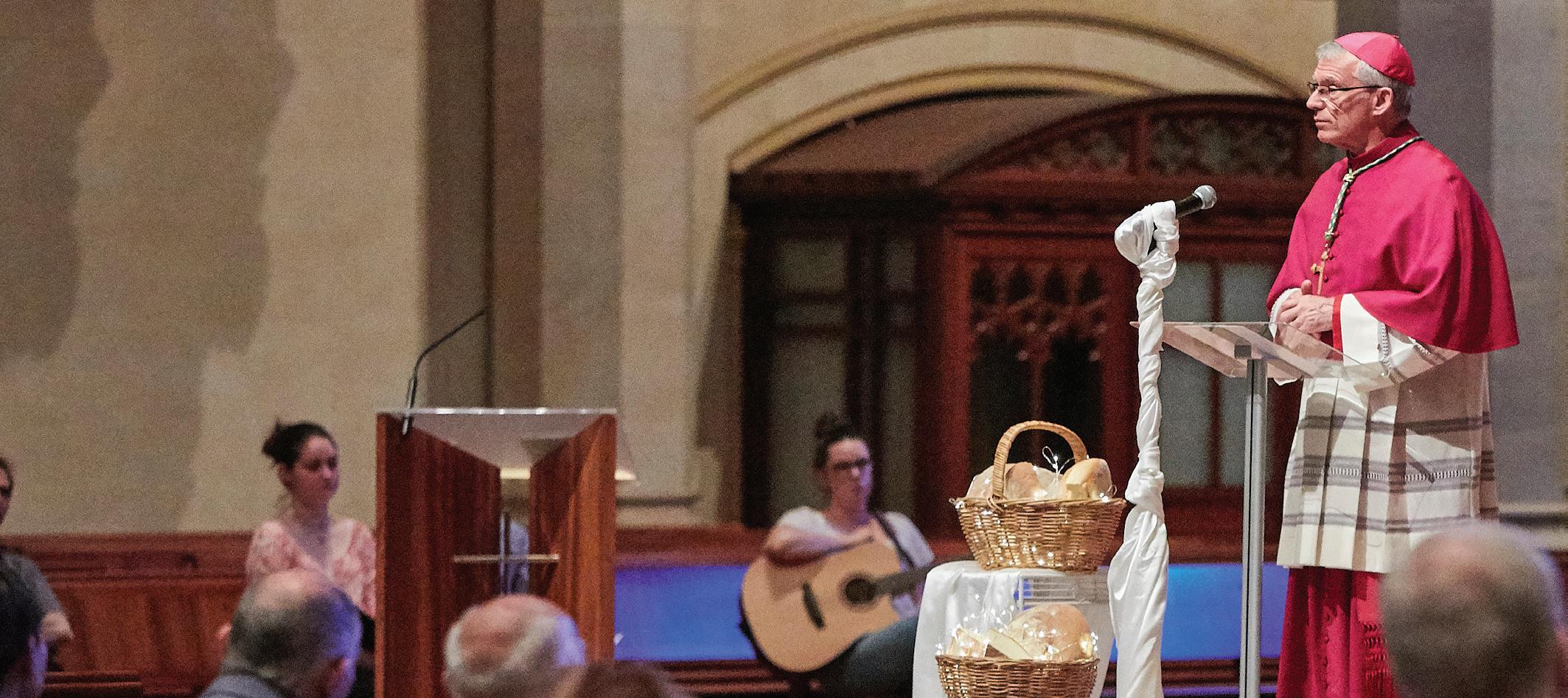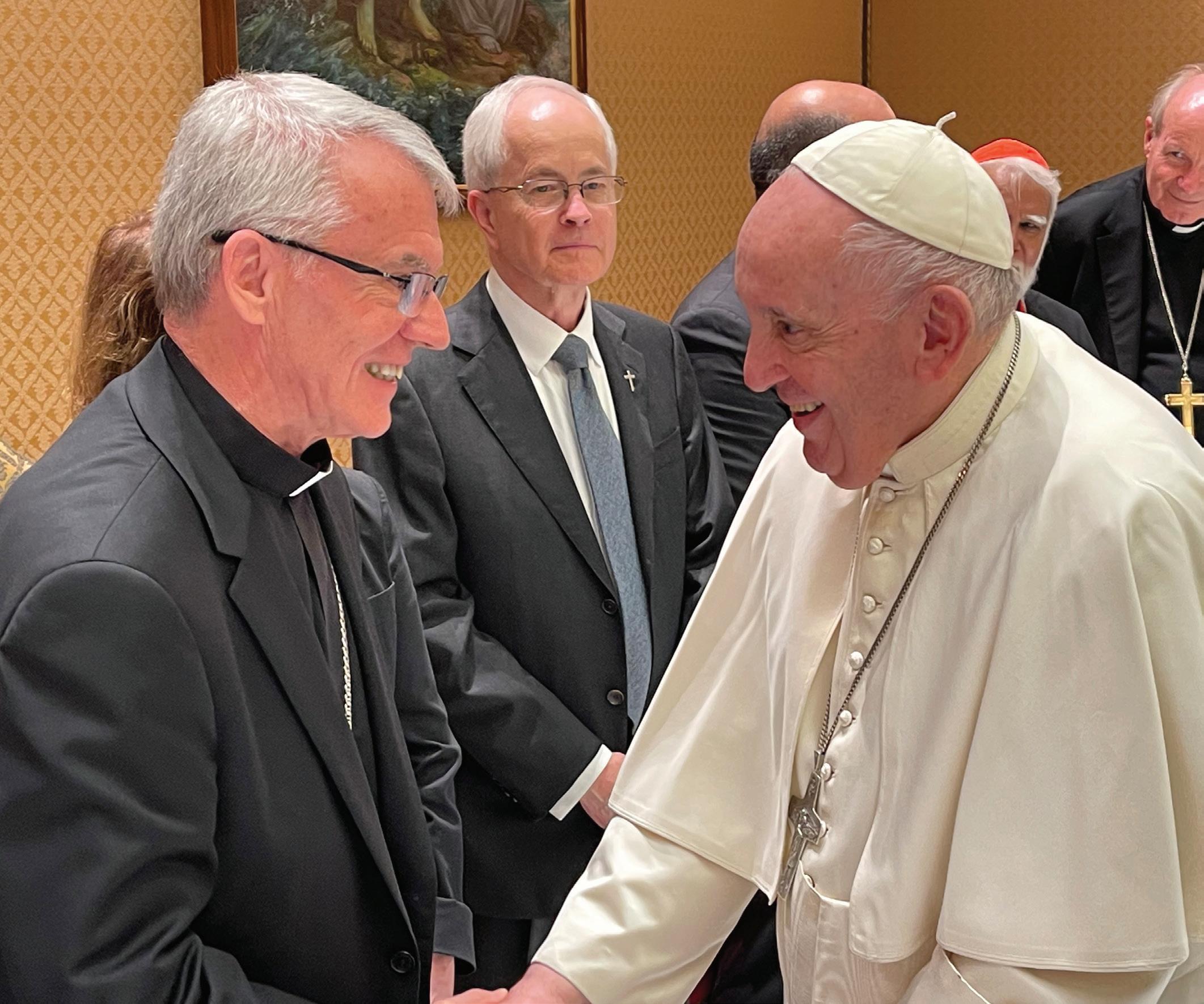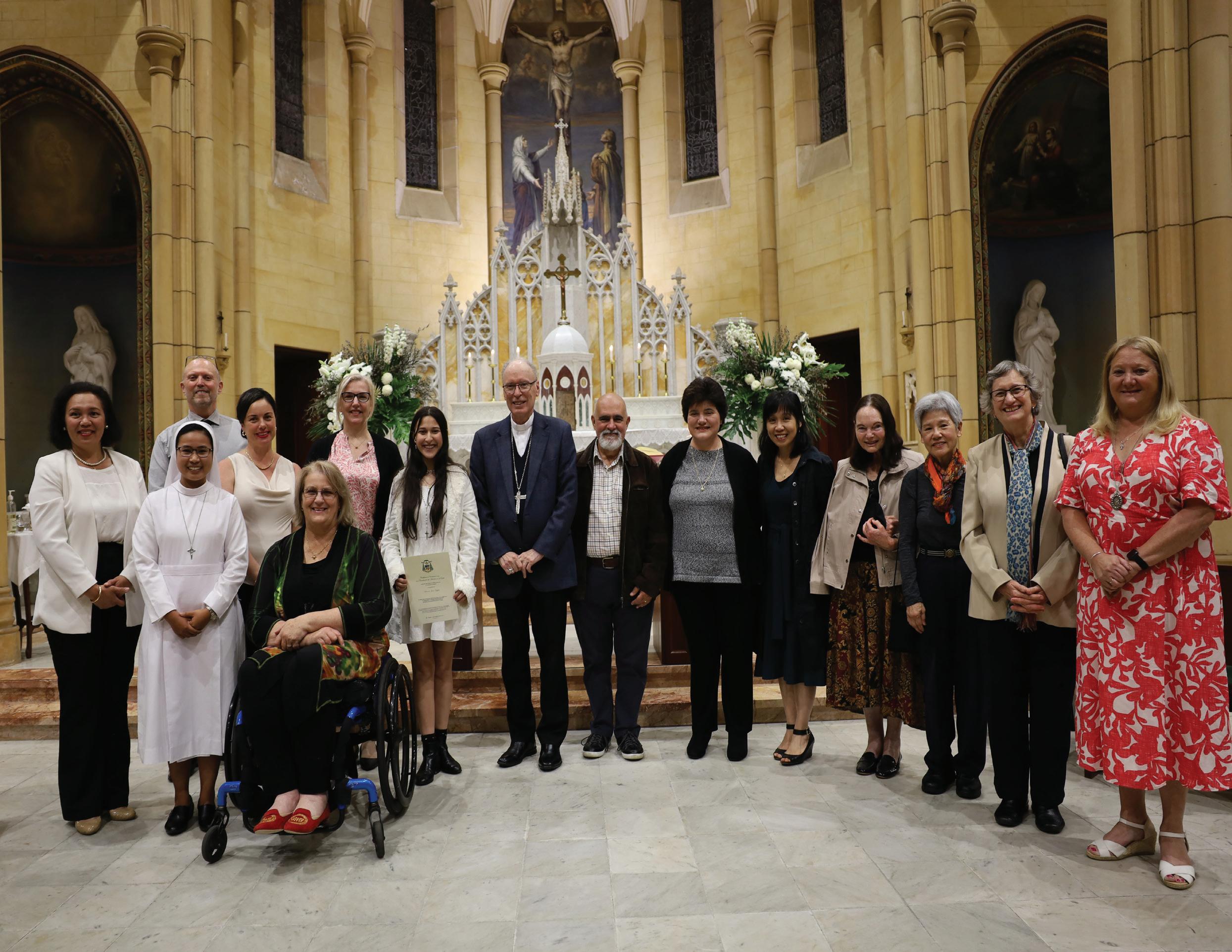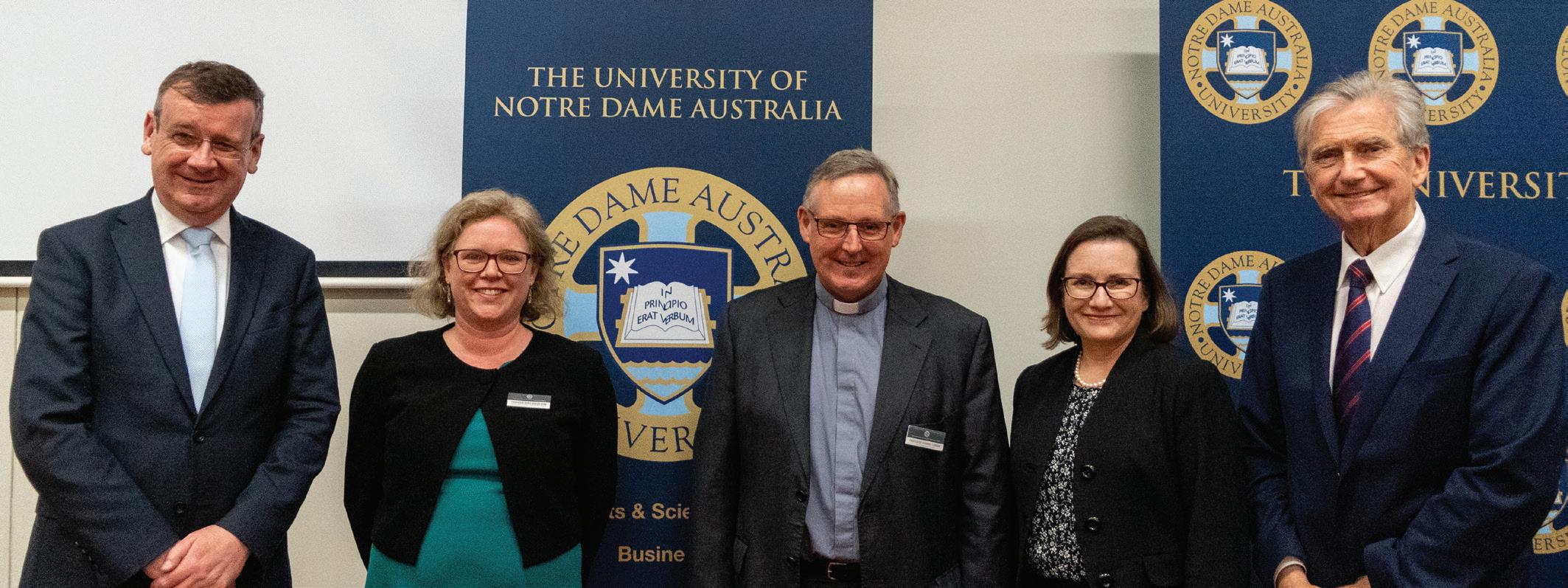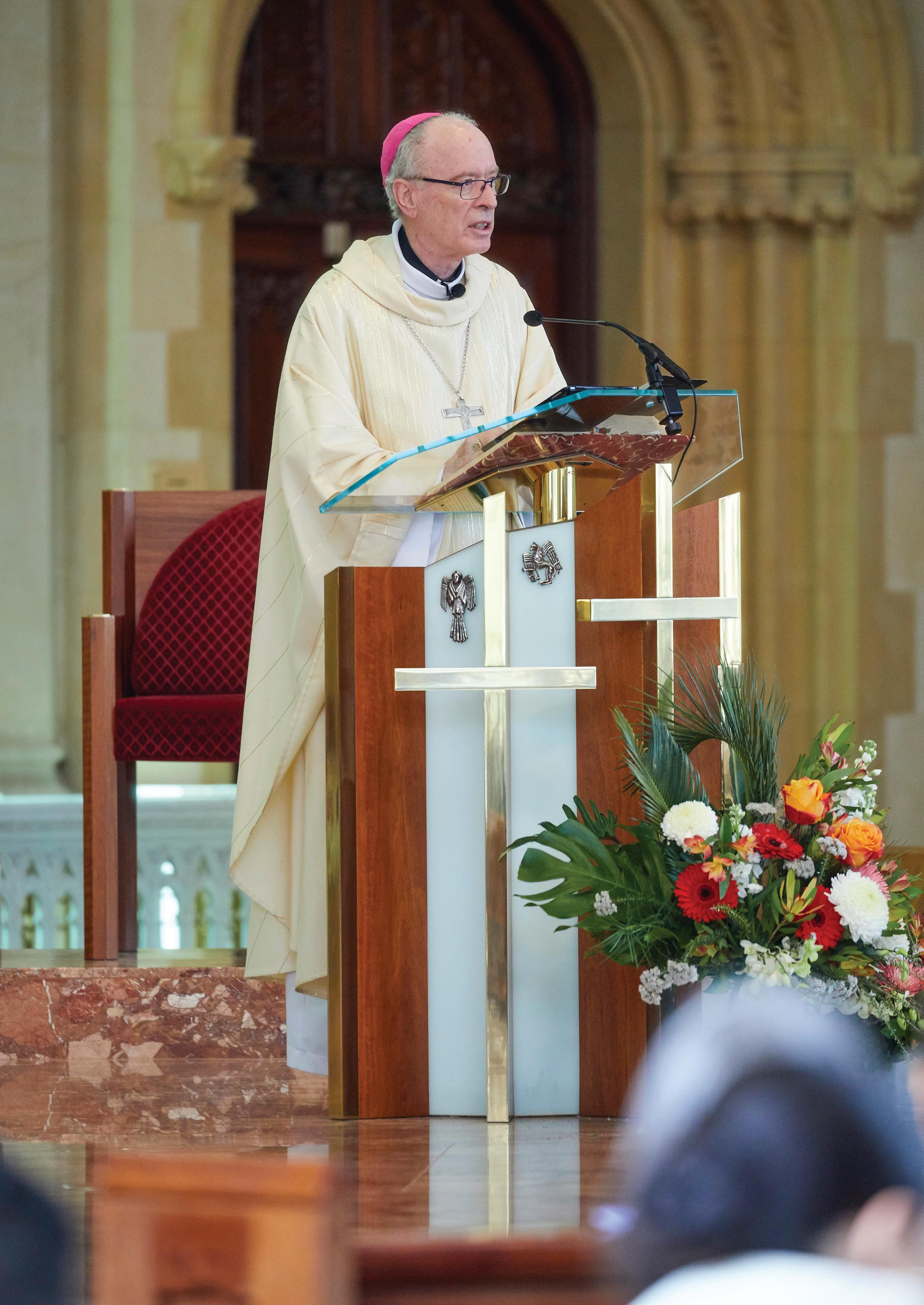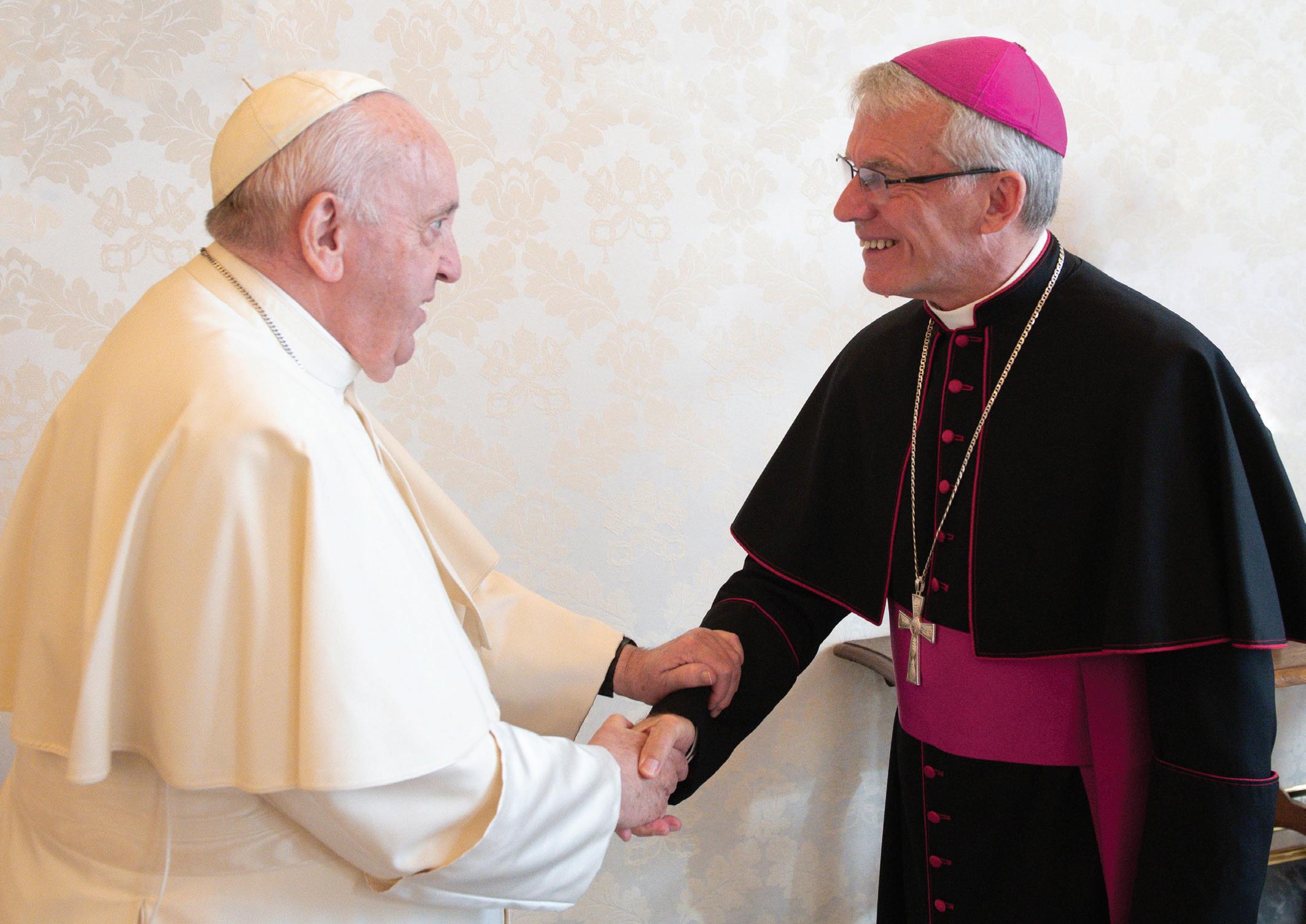
8 minute read
Archbishop Costelloe: Exclusive Interview
Exclusive interview: Australian Archbishop Costelloe tells Pope Francis ‘The church in Australia is alive.’
In their first private one-on-one conversation, President of the Australian Catholic Bishops Conference and Perth Archbishop Timothy Costelloe SDB, told Pope Francis, “The church in Australia is alive!”
In an exclusive interview with America Magazine journalist Gerard O’Connell, conducted over Zoom from his residence in Perth, Western Australia, Archbishop Costelloe talks about his audience with Pope Francis and also shares his thoughts on the recent Fifth Plenary Council of Australia, which many now view as a trial run for the global Synod on Synodality.
He also shares his reflections on the Frascati-Synod 2024 meeting, in which he participated, which recently released its report in preparation for the continental assemblies of the second phase of the Synod on Synodality.
The Record publishes this edited version of Part I of the interview. For the full story, go to www.therecord. com.au and search America Magazine

● Members of the working group who came together in Rome in September to draft a working document for the continental stage of the Synod process. Photo: Thierry Bonaventura/Synod 2024.
The audience with Pope Francis
The Salesian Archbishop, 68, was received in a private audience by the pope in the papal library of the Vatican’s Apostolic Palace on Thursday 6 October. Recalling the audience, he said: “Pope Francis was very kind to me. He strikes me as a very gentle man. When you’re talking to him, he’s engaged with you.” “He probably listened more than he spoke. He asked me about the Plenary Council and about the life of the church in Australia. We talked primarily about that council and the Synod on Synodality,” Archbishop Costelloe said. O’Connell also asked Archbishop Costelloe if Pope Francis was concerned about the situation of the Church in Australia, given all that’s happened in recent years. “I wouldn’t say he was concerned about the church in Australia, but he was interested to know,” says Archbishop Costelloe responded. “I talked about the reality that we had struck some difficult moments but that—and I believe this very strongly—the prayerful atmosphere we created, an atmosphere which generated a real sense of respect for each other, enabled us to navigate all of those difficulties,” he said. “I said that at the end of the Council Assembly, there was a real sense of energy and enthusiasm, and I finished up by saying in Italian, ‘La Chiesa in Australia é viva!’ It’s alive.” “And he said, “I am so pleased to hear you say that, I like that word ‘Viva.’” Archbishop Costelloe continued by emphasising he meant what he said. “I don’t for a minute pretend that we don’t have issues and challenges, but the church is alive in Australia. And I was struck by his enthusiasm, his sense of satisfaction in hearing, at least my assessment, that despite the challenges we face, we are a living and vibrant church. He was, I think, clearly pleased that the Plenary Council had gone well.” He was particularly struck by Pope Francis’ commitment to synodality. “His commitment to this synodal journey is absolutely rock solid. He’s deeply, deeply committed to this and really does see it as the way forward for the church, the way that the Holy Spirit wants to lead.”
Four Takeaways from the Plenary Council
Gerard O’Connell asked Archbishop Costelloe if he could share a few major takeaways from the Plenary Council. First of all, Archbishop Costelloe said, “This is probably the first time in the history of the church in Australia that we have been through anything like this, both in the breadth and the depth of the engagement of the bishops with everybody else in the church. “It’s not that the bishops have somehow been isolated from the rest of the church, but rather that there was such a concentrated effort on genuinely engaging with our people and listening to our people. That was a remarkable thing which, I think, has been something of a game changer for the church in Australia moving forward.” Second, Archbishop Costelloe said, he was personally struck by the number of people who over the course of the four years said to him, ‘For the first time, I’ve really had the opportunity to speak and know that I was being listened to…’ “There’s a universal feeling across the church in Australia that we have begun a way of being the Church in Australia that we cannot now go back on,” Archbishop Costelloe explained. “So, we have launched ourselves into this journey. When we started, the notion of a synodal church hadn’t yet emerged so clearly in the thinking of the pope, but that is in fact what we were doing. And this has proved to be such a deeply appreciated aspect of the whole journey of the Plenary Council by all of us: bishops, clergy, laity, everybody.” A third significant aspect of the Australian Plenary Council, says Archbishop Costelloe, was “the fact that right from the beginning of the whole process, we realised that it had to be a deeply spiritual process, not just a parliamentary process or something like that, but something deeply grounded in prayer. “Before we decided on the Plenary Council, the bishops had already decided that we needed to do something for the Church in Australia. We weren’t quite sure what that something was but, gradually, through our discussions and discernment, we came to the decision to have what we called a year of grace, which took place in 2012. Basically, it was an invitation from the bishops to the whole church in the country to go on a retreat.” The bishops decided on the Year of Grace he said, “because we knew there were big issues, big challenges. The horrors of the sexual abuse crisis had really become very obvious to us, but there were many other challenges as well. We came to the view that the challenges were so many and so grave that we needed to step back from them for a little while to focus on the essentials, and then move forward.” They were inspired by a phrase from Pope John Paul II in his apostolic letter Novo Millennio Ineunte: “Our witness would be hopelessly inadequate if we ourselves had not first contemplated [Christ’s] face.” “This almost became the motto for our Year of Grace,” Archbishop Costelloe explained. “We invited the church to do exactly that. It was quite successful, I think, across the country.” And it set up a spiritual foundation that would well serve the Plenary Council, he said. “One of the things that marked the two assemblies was the spirit of prayer. We started each day with prayer, half an hour each morning. I believe this is what enabled us to manage and deal with some very tense moments, particularly in the second assembly.” A fourth notable take away, he said, is the fact that “there is now a sense of hope, but also of expectation. Having concluded the Plenary Council there is a sense that this now has to bring change in the church in Australia.”
● Members of the working group who came together in Rome in September to draft a working document for the continental stage of the Synod process. Among them is Perth Archbishop Timothy Costelloe SDB, fifth from left, Fr Ormond Rush, third from left, and Susan Pascoe, centre. Photo: Thierry Bonaventura/Synod 2024.

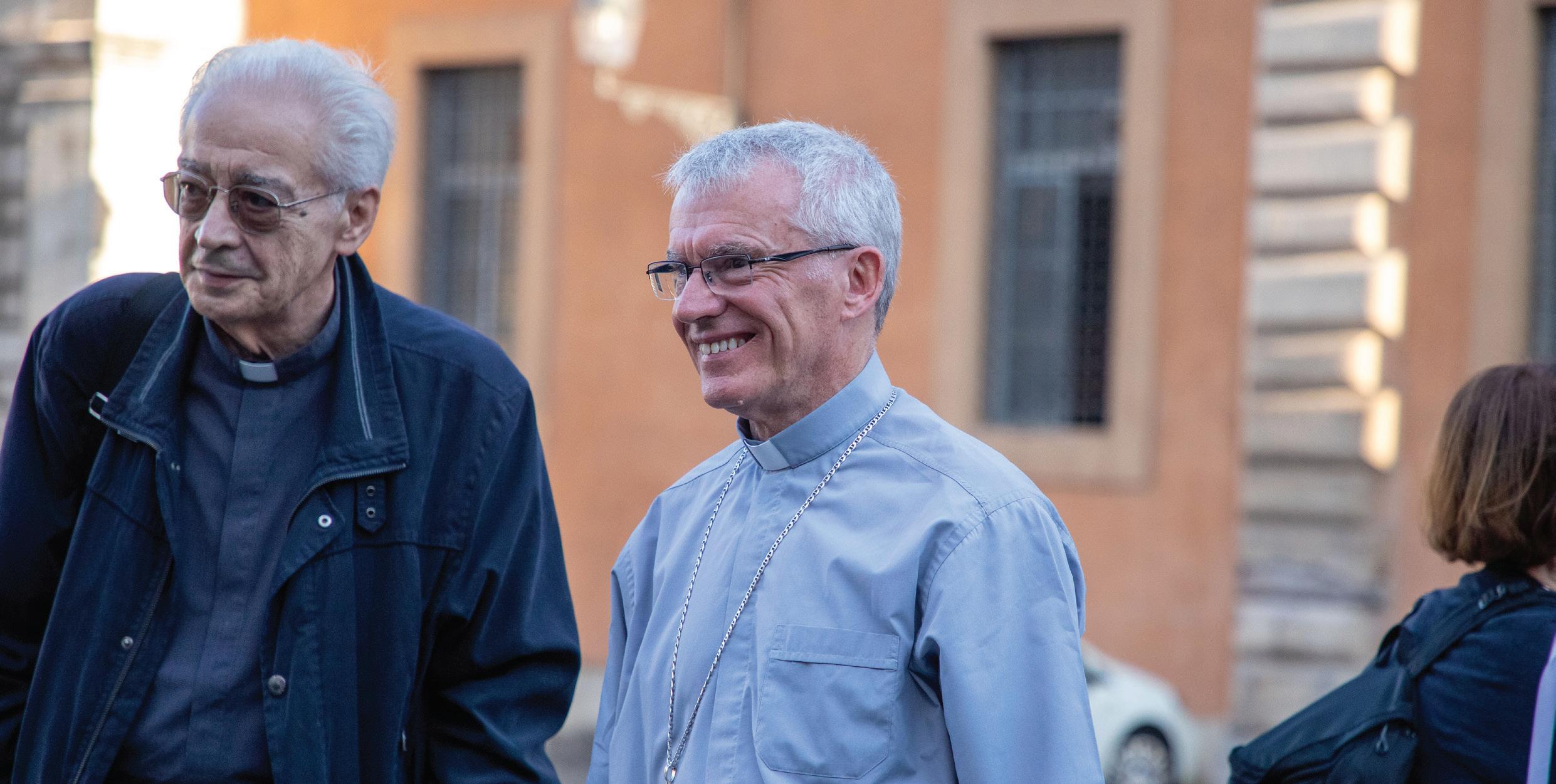
The Frascati meeting Archbishop Costelloe was the only bishop outside the synod organisers to participate in the Frascati meeting, which saw religious, clergy and lay people gathered in Frascati, Italy, in late September to synthesize synodal reports from dioceses around the world. He believes that Cardinal Mario Grech, General Secretary of the Synod, invited him to participate in the Frascati meeting because of his experience as President of the Plenary Council which, he said, was “a kind of a first go at a synodal process.” Having served as President of the Plenary Council enabled Archbishop Costelloe to offer “some positive guidelines” as well as “some challenges for the synodal process.” At that meeting, he recalled, the group discussed the reports from bishops’ conferences on the first phase of the synodal process. He learned that the experiences of some of the churches “are very different to ours in Australia,” such as situations where the Catholic Church is “a tiny minority” in “a very big non-Christian environment.” Nevertheless, he said, “I don’t think there was anything that I encountered in Frascati that surprised me, or that hadn’t been in one way or another present in our plenary council.” Archbishop Costelloe noted that “one of the most common themes” to emerge from the reports at Frascati “was a deep hunger for a welcoming church, a welcoming community. People want to feel that they belong, that they are welcome, that they are accepted. That was a very strong thing right across the board.” Other common themes related to “the role of women in the life of the church and society,” and “the wish for healthier or more engaging relationships between our people and their leaders (meaning the clergy).” Archbishop Costelloe noted that a theme that emerged “pretty much everywhere, in both secular and traditional societies” is “the urgent need for the church to engage better with young people.” He was particularly struck by the Frascati meeting and the way it was conducted. “It really was a wonderful experience of being with committed people, the vast majority of whom were lay, from all around the world, who were there with a great sense of commitment to the church and great hope for the kind of future that Pope Francis’ vision is opening up for us.” The process used, he said, was itself “a real experience of synodality. “We listened carefully to each other. Much of the time we were in groups, but the groups kept changing. So, on one occasion we might be in our continental groups; on another, we might have only men in the group or only women in the group. “The most powerful impression I came away with,” he said, “was the unshakable commitment, particularly of Cardinal Grech, but also of Cardinal Hollerich and the rest of the facilitation team, to make sure that the document we produced faithfully represented the voice of the universal church. Gerard O’Connell is America Magazine’s Vatican correspondent and author of The Election of Pope Francis: An Inside Story of the Conclave That Changed History. He has been covering the Vatican since 1985.


